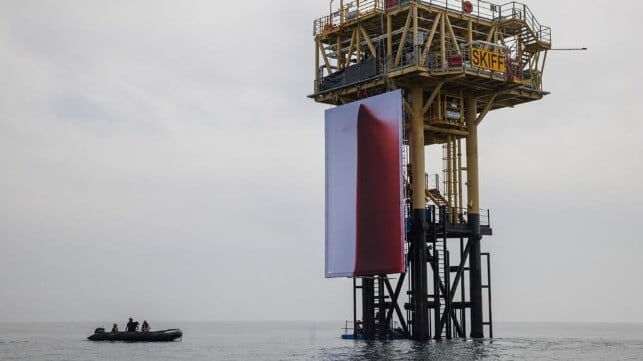Sir Anish Kapoor Designs Offshore Sector's First Public Art Installation

Working with Greenpeace UK, sculptor Sir Anish Kapoor CBE has completed an unauthorized and potentially illegal modern art installation at a platform in the North Sea. It may be the first piece of "fine art" - designed and conceived by a figure from the modern art world - ever to debut aboard an offshore oil and gas structure, Greenpeace said in a statement.
Kapoor, known best for public installations like "The Bean" on the Chicago waterfront and the "Orbit" sculptural tower in London, has a background in stainless steel and structural steel artworks, so the choice of a steel offshore platform is within keeping for his work. For the debut of this piece, Kapoor selected the Skiff wellhead platform, an outlying facility at the Brigantine gas field cluster. The platform is located in the North Sea about 60 nautical miles northeast of Bacton, a town on Britain's Norfolk coast.
Without authorization from facility owner Shell, Greenpeace UK mobilized a climb team, a large canvas, and a 40-foot-tall "frame" of aluminum tubing to the Skiff site. In foggy but calm summer weather, the team boarded the platform from a RIB, assembled the frame and stretched the canvas across it. Then they hoisted a high-pressure hose to the top and sprayed about 250 gallons of food-based nontoxic dye onto the fabric, completing Kapoor's design.
The piece is intended to convey an activist message related to carbon emissions and oil and gas. Kapoor has titled the work "Butchered," and his accompanying artist's statement is a critique of industry.

that matters most
Get the latest maritime news delivered to your inbox daily.
Shell did not comment on the message or the aesthetics of the work, but in a statement, the supermajor noted the safety risks and the potential illegality of the installation process.
"Greenpeace entered a restricted safety zone around the platform without permission, which is established under UK law to protect people and prevent collisions. Their actions were extremely dangerous, involved illegally trespassing and put their own and others’ lives at risk," the company told The Guardian.
